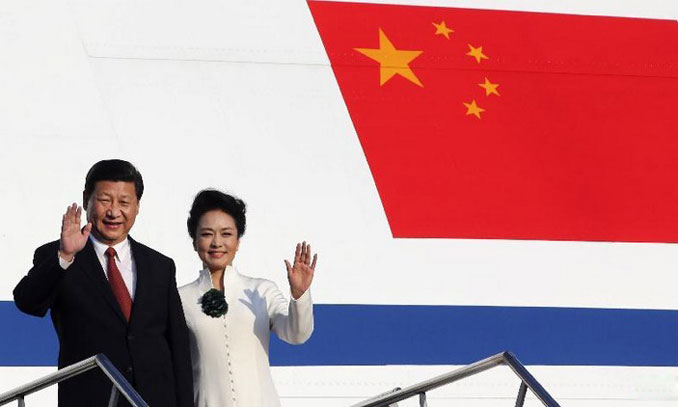Sure, its quite true, Aunt Connie, and thank you for raising the issue!
Now, I'm not sure how old you may be, but (sadly) I'm old enough to remember the problems of industrial pollution in the west and the long struggle to change it. I can remember reports of winter time 'pea-soup' fog in say London, where on the worst days you could not see a metre in front you. And, in beautiful Sydney, I recall standing on a roof top in South Sydney, (I was a labourer with a roof repair co.) watching all the smoke from factories in the old industrial heart of Sydney (Alexandria to St.Peters -and it seemed like hundreds of smoke columns) rising up to Yahweh. As I recall it Paris had the same problem and New York. I picked London because being "British to the boot-heels", back in Bob Menzies day, (you recall Bob M do you, he was the guy always threatening us with 'reds under the beds.') we heard about London more than any other place.
reference: http://en.wikipedia.org/wiki/Pea_soup_fog
Pea soup fog
From Wikipedia, the free encyclopedia
This article is about the term for thick fog or smog.
Pea soup, or a pea souper, also known as a black fog or killer fog, is a very thick and often yellowish, greenish, or blackish smog, caused by air pollution that contains soot particulates and the poisonous gas sulfur dioxide. These very thick smogs occur in cities and are derived from the smoke given off by the burning of soft coal for home heating and in industrial processes. Smog of this intensity is often lethal to vulnerable people such as the elderly, the very young and those with respiratory problems.
London
Such fogs were prevalent in UK cities, especially London where the smoke from millions of chimneys combined with the mists and fogs of the Thames valley. The result was commonly known as aLondon particular or London fog, which then, in a reversal of the idiom, became the name for a thick pea and ham soup. [1]
An 1871 New York Times article refers to "London, particularly, where the population are periodically submerged in a fog of the consistency of pea soup..." The fogs caused large numbers of deaths from respiratory problems.
Clean Air Act
The worst recorded instance was the Great Smog of 1952, when 4,000 additional deaths were reported in the city over a couple of days, leading to the passage of the Clean Air Act 1956 which banned the use of coal for domestic fires in urban areas. The overall death toll from that incident is now believed to be around 12,000
Cultural references
Contrary to popular impression, the Arthur Conan Doyle Sherlock Holmes stories contain only a handful of references to London fogs, and the phrase "pea-soup" is not used. A Study in Scarlet (1887) mentions that "a dun-coloured veil hung over the house-tops." The Adventure of the Bruce-Partington Plans (1912) describes "a dense yellow fog" that has settled down over London, and later notes, "a greasy, heavy brown swirl still drifting past us and condensing in oily drops on the windowpane".
In Chapter 3 of Charles Dickens' Bleak House, when Esther arrives in London, she asks of the person meeting her, "whether there was a great fire anywhere? For the streets were so full of dense brown smoke that scarcely anything was to be seen. 'O, dear no, miss,' he said. 'This is a London particular.' I had never heard of such a thing. 'A fog, miss,' said the young gentleman."
Do you think (grin) it could be argued, Aunt Connie, that one way of seeing the last 40 years would be that the west exported its pollution problems to China? (OK, I admit that's a bit 'tongue in cheek.')
----------------------
quote: The little propaganda machine for Mao and Deng-Xiao-Ping Bridge Plan!
Not sure where you're going with that comment, Aunt Connie? Is that a well-considered comment after some research? If it is, maybe you need to change you're source of information.
Even though both Deng and Mao were members of the CPC, they were on opposite sides of the internal party debate as to how to re-build China's strength. Mao and his side, wanted a centralised, state owned (socialist) system, and others (Mao called them the "capitalist roaders, because they wanted at least a freer market based system). Deng was jailed for years on Mao's instructions because of his advocacy for more private enterprise.
When after Mao's failed 'big leap forward' ( as XJW's we ought to remember the role of slogans) the Party attempted to remove Mao from executive positions. China's Cultural Revolution was Mao's attempt to re-assert his authority. It nearly wrecked the progress that had been made since 1949. Everyone held their breathe. When Mao died, the party soon put Deng in the executive position. At that point in time, it could be said that everyone in China, was nearly equal - "equally poor." (grin). The 'capitalist-roaders' in the party with Deng in charge realised that some people and some areas would get rich faster than others and so it proved, but you should admit that their policies have succeeded. Do you?



